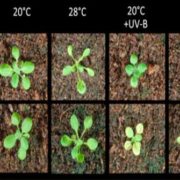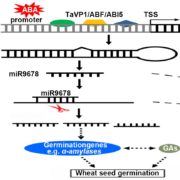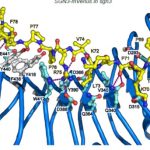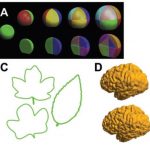Update. GMO-free RNAi: exogenous application of RNA molecules in plants (Plant Physiol)
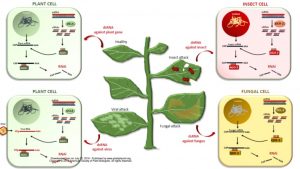 Criticism of transgenic plants and GMOs motivates research into effective GMO-free RNA delivery methods. In this review, Dalakouras et al. discuss different strategies for exogenous application of RNA molecules (dsRNAs, siRNAs) into plants to trigger RNA interference (RNAi) against various targets, such as endogenous plant genes, viruses, viroids, insects, mites and fungi. The authors conclude that the most efficient way to induce systemic RNAi in plants is by exogenously applying 22-nt siRNAs. For plant gene and virus targets, high-pressure spraying allows symplastic RNA delivery, enabling RNAi uptake into plant cells for endogenous gene silencing. For insect and fungus management, because RNAi takes place inside their cells, the uptake of non-processed dsRNA is needed. Trunk injection, petiole absorption and low-pressure spraying as apoplastic delivery methods allow this. Furthermore, secretion of exosome-like extracellular vesicles in Arabidopsis has been identified, which enables RNA delivery into other taxonomic kingdom such as fungal cells. Finally, the authors considered technical improvements for dsRNA applications, like joining them with nanoparticles and carrier peptides to improve delivery, and using large-scale bacterial bioreactors to lower the costs of dsRNA production. (Summary by Ana Valladares). Plant Physiol. 10.1104/pp.19.00570
Criticism of transgenic plants and GMOs motivates research into effective GMO-free RNA delivery methods. In this review, Dalakouras et al. discuss different strategies for exogenous application of RNA molecules (dsRNAs, siRNAs) into plants to trigger RNA interference (RNAi) against various targets, such as endogenous plant genes, viruses, viroids, insects, mites and fungi. The authors conclude that the most efficient way to induce systemic RNAi in plants is by exogenously applying 22-nt siRNAs. For plant gene and virus targets, high-pressure spraying allows symplastic RNA delivery, enabling RNAi uptake into plant cells for endogenous gene silencing. For insect and fungus management, because RNAi takes place inside their cells, the uptake of non-processed dsRNA is needed. Trunk injection, petiole absorption and low-pressure spraying as apoplastic delivery methods allow this. Furthermore, secretion of exosome-like extracellular vesicles in Arabidopsis has been identified, which enables RNA delivery into other taxonomic kingdom such as fungal cells. Finally, the authors considered technical improvements for dsRNA applications, like joining them with nanoparticles and carrier peptides to improve delivery, and using large-scale bacterial bioreactors to lower the costs of dsRNA production. (Summary by Ana Valladares). Plant Physiol. 10.1104/pp.19.00570




